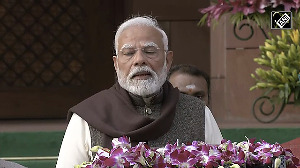What do you think needs to be done by the government and the great people of Mumbai to ensure such a disaster does not occur again? The second lot of responses are published below almost verbatim:
First responses: 'Stop blaming the rains'
What I have to say won't make me popular.
It's time for Mumbaites to wake up and smell the coffee - It's all too easy to blame everything on the government, but Mumbaities are equally to blame. For the utter disrespect they have for the city. For the crime of irresponsibility that they are guilty of. For treating the streets of their city like a garbage dump.
I am not saying the government is doing a great job - it sucks! But so do we citizens -- we need to take a long hard look at ourselves.
Mumbai is by far the dirtiest city in India, and dare I say, the world. It has left the slums of Calcutta far behind. Each Mumbaite must share the blame for the disastrous state of affair in Mumbai. Perhaps now the citizens will realise the truth behind the saying that each bag of plastic that you toss away ends up clogging a rainwater drain.
Wise up Mumbaites! Get a social conscience and learn civic responsibility -or else pay the price without moaning!
-- Jagat Rathore
Any great city sustains its status with the infrastructure it maintains. The 19th and 20th century rulers built Mumbai by identifying its geographical potential for trade, and constructing its infrastructure to last for the next century. The architects and town planners under the British Raj of the late 19th century gave it a look and feel that closely resembles London. Their careful infrastructure planning made the city to grow into a financial powerhouse for a good part of pre & post independence era.
The cultural diversity that trade and commerce brought to Mumbai over the last 150 years made it a unique place in many respects which Mumbaikars are still proud of. It is this infrastructure that attracted the elite and the ambitious people. It is the ambitions of these people that flourished in a so called well built and maintained city during the 20th century.
The first Indian railway was built in Mumbai.
The First Indian Cinema started in Mumbai. Asia's largest IMAX theater is in Mumbai.
Built in 1833, the Asiatic Society of Bombay is the oldest public library in the city.
The Jehangir Art Gallery and The National Gallery of Modern Art, The Prince of Wales Museum in South Mumbai and many such monuments, temples and historical sites have made Mumbai a landmark city.
It is not by accident that Mumbai is the birthplace of many firsts. This could be attributed to good governance, ambitious plans and a well built infrastructure system then present that attracted the working class and the elite together to pursue their dreams.
Thus for the last century and a half, Mumbai has been perceived as a city to pursue your dreams. That reputation has led to a mass influx, overburdening the city's limited infrastructure and creating resentment between the original inhabitants and the people who arrive with dreams of striking it big.
With the limited land that Mumbai has, managing these psychological expectations of the people should be the first step towards any infrastructural development.
Being a democratic society, this naturally cannot be forced on to people. But it could be managed by regulations, right representations, managing people's expectations and dreams in their hometowns and extending the infrastructure beyond Mumbai and its suburbs.
The legacy of the British-built infrastructure that we are blindly riding on for the last fifty five years needs to stop. If last week's gridlock is any indicator, we need to start thinking about the direction in which we are taking our city.
Rather than shifting blame to our government that we elect, we should look within ourselves.
When was the last great architectural structure built in or around Mumbai?
Since Independence, we have become a more reactive society than being proactive to our ever growing needs, and encourage the large influx of people and haphazard building without giving due regard to the sanctity and sustainability of the area.
Just after independence, a new wave of nationalism led to great strides in building many dams and infrastructure throughout India. That pride in building for the future has waned away.
Let this monsoon rain be the revival of that wave. Let us bring back our enthusiasm to stop and think, to do something for our future. We owe it to ourselves and our future generation to nurture a right attitude towards making Mumbai the architectural landmark of the 21st Century.
Kuala Lumpur, Seoul, Singapore and many other cities have the same problems as Mumbai, yet they succeeded far better than Mumbai in developing world class communities over the last couple of decades. They have shown that the will of the people, the politicians, the town planners and the private sector working together builds a great city.
We are in no way lagging behind in Mumbai, other than our will to plunge in the right direction. Our politicians need to work for the people rather than for themselves. The present government lacks the audacity to take on ambitious projects at the grass root levels. Very seldom have we seen a Mumbai government joining hands with the private sector to take on the needs of the future to build a great city.
No wonder the likes of Bangalore and Hyderabad and Pune and Noida are leaping ahead, while our cynical local government continues to take Mumbai's status as a financial powerhouse for granted.
Our politicians were quick to change the name of 'Bombay' the financial powerhouse to Mumbai (land of goddess Mumba Devi). Now we owe it to the goddess to at least make a constructive effort to develop an infrastructure to keep it clean without just setting up committees and passing blame on each other.
Everything is possible in Mumbai. Let us all make this dream come true to make our children and our grand children proud of us and proud of Mumbai.
-- Ajay Wagh, a Mumbaikar in Houston
The never say die spirit of Mumbai is well appreciated, but the government is taking advantage of it.
That attitude enables citizens to help themselves and forget these things after the calamity is over. For some time people may even curse the government, but after a month or so everything is back to normal and no one really bothers till the next calamity or tragedy strikes. I would say people in Mumbai are very submissive and bear all nonsense in silence, which should not be the attitude.
No one is really taken to task in this city. The chaltha hai attitude is everywhere. There are many steps that can be taken, but it is of no use writing about them, since the will will to implement them will last only for the next 15 days or maximum for a month.
Every politician and the administration take Mumbaikars for granted. First of all this impression should be changed then the rest will automatically follow. It is only useful to talk about these after the impression of the people are changed...
-- Hemant
The basic problem of the highly spirited people of Mumbai is lack of civic sense, traffic sense, and knowledge of their rights. To add to it corruption has made inroads in all aspects of life so terrible that we have not only started condoning it but feel that it is a inseparable path of our life.
We allow politicians to misguide us, and focus on non issues and let calamities like this strike us with nowhere to go.
We should understand the basic universal truth that we get what we deserve.
Nevertheless the people of Mumbai do have a heart and still can rise to occasion. Like Surat, which is a cleaner place to live now thanks to the plague threat, we should all take corrective steps and automatically the government will have to follow the wishes of it subjects
God bless Mumbaikars
-- M Rasiwala
For the past two days the television channels are full of affected citizens and so called citizen activists accusing the Maharashtra government of being inactive, useless etc.
However, we need to ponder whether we as citizens are performing our jobs properly. Who is to be blamed for this calamity? What should we do to ensure that it does not happen again?
It is easy to blame the government. But did those doing so attend office for the last 5 days? If they could not, how do they expect poor class IV employees of BMC/TMC/KDMC who are also affected due to floods to do so?
The government and all political parties have to be blamed for playing partisan politics. In order to retain their vote bank, political parties are allowing slums to grow in every nook and corner of the city.
One of the main reason for bad sewage is slum dwellers. Because of them filth is littered all over the place and no one wants to take the responsibility of removing the increasing pile of garbage. Mr Vilasrao Deshmukh undertook a sincere effort for clearing the slums but was stopped by Her Highness Sonia Gandhi. We should ask her to live near an unauthorised slum then see her reactions.
Second menace are the tabelas in the heart of the city, another fertile ground for filth generation. The tabela owners are so callous that they tied all the buffalos, preventing them from swimming to safety. We should in fact book all the tabela owners for culpable homicide.
At least now politicians like Sonia Gandhi, Bal Thackeray etc should learn a lesson and take corrective steps to prevent such disasters in future.
These steps are
-
Remove all slums irrespective of the day they are built. slum should be out of city areas including thane, kalyan etc.
-
Do not permit unauthorised constructions (all done with the knowledge of ward officers)
-
Do not give permission for new construction recklessly without assessing water and other infrastructure facilities Ensure ban of polythene bags Cultivate the system of collecting separately dry garbage and wet garbage. Ensure fuses and live wires are not kept in unsafe condition in roadside lamps etc Heavily penalize power theft, a normal feature during political rallies and by slums.
-
Train police and municipal staff on effective crisis management
-
Reduce unnecessary security cover to all and sundry politicians
When I was in Kolkata in the beginning of this month I was surprised to note that there was no security person accompanying the West Bengal chief minister. He is a true leader, unlike our leaders who pride in having scores of security person attached to them and wasting public money. I feel these leaders are gutless and paranoid that they cannot behave like west Bengal chief minister.
-- Natrajan T S
The measures to be undertaken are as follows:
1- Improve the drainage systems
2- Stop excessive building constructions
3- A check on Mangrove degradation and other forest cover
4- A strict check on migrants in the city by setting up a population monitoring system
5- A more committed administrative system
6. There should be more open spaces in the city, more greenery than concrete jungles.
The basic question is, Does Bombay/Mumbai have enough capacity to hold the large number of buildings, and the large number of illegal migrants who only mess up the city by producing slums and increasing the population?
Bombay began with 7 islands...The day is not far when we'll be back to that number or even worse!
-- Neelam
I was a resident for Bombay (Mumbai) till 1994. I used to live in Andheri, Veera Desai Road. I remember very well when our apartment got flooded twice from 1991-1993. The water level may not have been as high as what it was on "Terrible Tuesday", but it was high enough for us to lose almost all our belongings. I remember people kept blaming the clogged sewer system at that time.
It just seems amazing to me that over the following years, there seems to be no or minimal efforts to clear the sewers. No efforts to lay a solid infrastructure for building office complexes. Now, it seems we have been adding and building malls and buildings like there is no tomorrow, without considering the danger.
Does the government and BMC even consider whether the current infrastructure can handle such sudden expansion? How come no one learns from the previous mistakes? People let things be as they are and pray that nothing bad will happen.
Bombay needs to learn and take better steps to have a solid infrastructure for generations to come. Stop continuing and funding blind construction of buildings. Let the process go through a rigorous evaluation by a committee. And please make every effort to stop under the table dealings as we are talking about people's lives, which are not cheap.
There should be a committee or a group set up to drive efforts to solve the errors done in the past. There should be a better weather warning system, which should alert citizens a week beforehand in case of such emergencies.
Considering the fact that we are growing by leaps and bounds in technology, how come we don't have a top grade weather warning system in India? We need to invest the money in that area instead of adding more buildings and malls.
It was just irresponsible to not inform thousands of daily office workers about such weather changes. Many lives were lost because of sudden flooding and uninformed citizens. That could have been avoided and must be avoided on all counts.
I know I am talking from outside Bombay, but considering the image we are creating of being among the fastest growing economies, we can't afford to just hang out and let things like these roll by for yet another bigger catastrophe, which I hope and pray does not happen.
We can't just spend money in buying the latest IPod and not worry about the days like these. Donate money to support changes and fixes in the infrastructure, if that's what it takes. Make sure that money is going where it needs to go. Create an internet site to track the money. We have earned the reputation and credibility that we have been waiting for a very long time; we can't just lose it in few days.
I hope the young generation uses some of their hard earned money, knowledge and their great spirit to make Mumbai one of the best cities in the world.
Jai Maharashtra!!!
-- Nikhil G
An SMS from my dad came as I sat down to write this, saying that my colony in Kurla is again floded, there is knee deep water & it's rising..
First of all being a Mumbaikar I would like all Mumbaikars to join hands irrespective of caste, religion & status and work towards helping the suffered ones.
Secondly we must throw this government out of power at any cost. This government has failed on all fronts. I agree you cant fight nature, the god, but we can take measures to minimize losses, right?
Imagine what would have happened if there was a massive earthquake, or a tsunami. The impact would have been beyond our imagination.
We don't need any government, president's rule is more than enough for us. We don't need a BMC either, because even in past to clean our drains or rectify water problem we hired private contractors, since no one from BMC attended to our repeated complaints...am I right dear Mumbaikars?
We must wake up now...this is the right time & last chance for us to react.
To react for our survival, to react for our basic rights, to react for our peaceful living, to react for a better Mumbai for our children (not a Shanghai).
-- Zafar- A true Mumbaikar from Kuwait
Get the basics correct, everything will fall in place.
Being an electrical engineer, I know the importance of drawing a correct plan that is "practically possible" and then implementing it. In our case the government seems to draw plans on paper without knowing how to implementing them.
Further, working with a US based company, I've seen processes running not just big projects but giant organizations, which run and deliver without fail in adverse situations.
Maybe our government can take lessons from successful companies and put all its employees under "tight processes" with targets that see everything running successfully.
Those failing to follow the processes should be severely punished.
Otherwise, there will be no improvement.
-- Anand Arora
First lot of responses: 'Stop blaming the rains'






 © 2025
© 2025